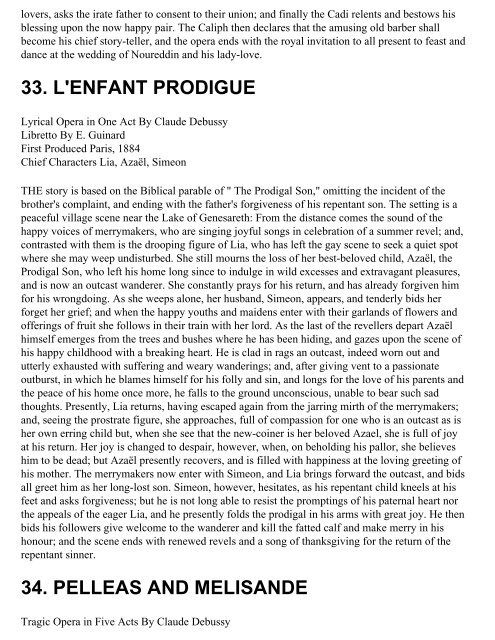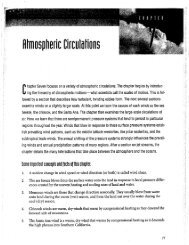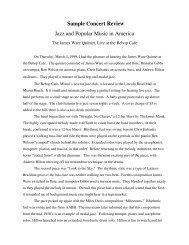Opera Plots I - MDC Faculty Home Pages
Opera Plots I - MDC Faculty Home Pages
Opera Plots I - MDC Faculty Home Pages
Create successful ePaper yourself
Turn your PDF publications into a flip-book with our unique Google optimized e-Paper software.
lovers, asks the irate father to consent to their union; and finally the Cadi relents and bestows his<br />
blessing upon the now happy pair. The Caliph then declares that the amusing old barber shall<br />
become his chief story-teller, and the opera ends with the royal invitation to all present to feast and<br />
dance at the wedding of Noureddin and his lady-love.<br />
33. L'ENFANT PRODIGUE<br />
Lyrical <strong>Opera</strong> in One Act By Claude Debussy<br />
Libretto By E. Guinard<br />
First Produced Paris, 1884<br />
Chief Characters Lia, Azaël, Simeon<br />
THE story is based on the Biblical parable of " The Prodigal Son," omitting the incident of the<br />
brother's complaint, and ending with the father's forgiveness of his repentant son. The setting is a<br />
peaceful village scene near the Lake of Genesareth: From the distance comes the sound of the<br />
happy voices of merrymakers, who are singing joyful songs in celebration of a summer revel; and,<br />
contrasted with them is the drooping figure of Lia, who has left the gay scene to seek a quiet spot<br />
where she may weep undisturbed. She still mourns the loss of her best-beloved child, Azaël, the<br />
Prodigal Son, who left his home long since to indulge in wild excesses and extravagant pleasures,<br />
and is now an outcast wanderer. She constantly prays for his return, and has already forgiven him<br />
for his wrongdoing. As she weeps alone, her husband, Simeon, appears, and tenderly bids her<br />
forget her grief; and when the happy youths and maidens enter with their garlands of flowers and<br />
offerings of fruit she follows in their train with her lord. As the last of the revellers depart Azaël<br />
himself emerges from the trees and bushes where he has been hiding, and gazes upon the scene of<br />
his happy childhood with a breaking heart. He is clad in rags an outcast, indeed worn out and<br />
utterly exhausted with suffering and weary wanderings; and, after giving vent to a passionate<br />
outburst, in which he blames himself for his folly and sin, and longs for the love of his parents and<br />
the peace of his home once more, he falls to the ground unconscious, unable to bear such sad<br />
thoughts. Presently, Lia returns, having escaped again from the jarring mirth of the merrymakers;<br />
and, seeing the prostrate figure, she approaches, full of compassion for one who is an outcast as is<br />
her own erring child but, when she see that the new-coiner is her beloved Azael, she is full of joy<br />
at his return. Her joy is changed to despair, however, when, on beholding his pallor, she believes<br />
him to be dead; but Azaël presently recovers, and is filled with happiness at the loving greeting of<br />
his mother. The merrymakers now enter with Simeon, and Lia brings forward the outcast, and bids<br />
all greet him as her long-lost son. Simeon, however, hesitates, as his repentant child kneels at his<br />
feet and asks forgiveness; but he is not long able to resist the promptings of his paternal heart nor<br />
the appeals of the eager Lia, and he presently folds the prodigal in his arms with great joy. He then<br />
bids his followers give welcome to the wanderer and kill the fatted calf and make merry in his<br />
honour; and the scene ends with renewed revels and a song of thanksgiving for the return of the<br />
repentant sinner.<br />
34. PELLEAS AND MELISANDE<br />
Tragic <strong>Opera</strong> in Five Acts By Claude Debussy













